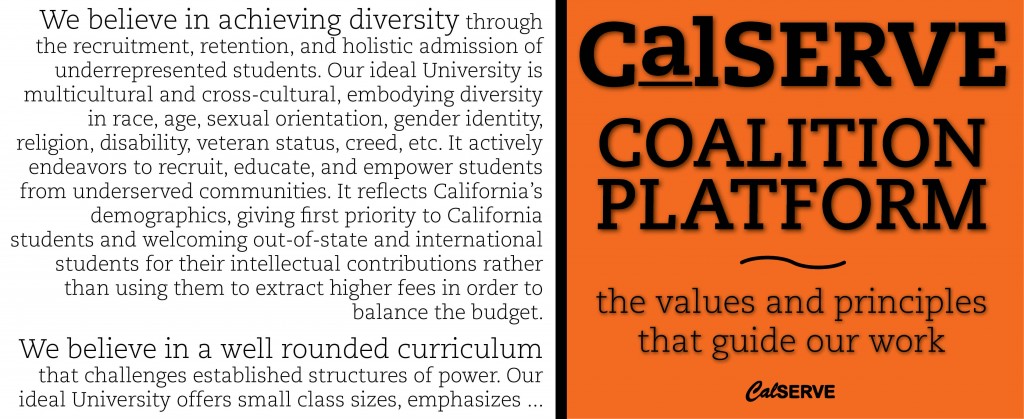Coalition Platform
CalSERVE believes that students should work with faculty, staff, and administration to improve our experience at Cal.
… the growth of our minds rather than our résumés, and provides opportunities for interactive and interdisciplinary learning. In assessing students’ performance, it promotes collaboration instead of competition and does not give preferential status to students with more privilege. It requires enrollment in civic engagement and history courses that encourage involvement in the political process and are accurate to the lived experiences of students and their historical identities. It includes a College of Ethnic Studies, inspired by the Third-World Liberation Front of the 1960s and 1990s.
We believe in a tuition free university where affordability is not a barrier to access. Along with free education, our ideal University offers affordable textbooks and affordable housing for its students.
We believe in comprehensive services that contribute to the academic, intellectual, and physical success of the students that use them. Our ideal University provides free health insurance, accessible services around hate crimes and sexual assault, and community spaces that make the University feel like home. It affirms services like the Multicultural Community Center (MCC) and Multicultural Student Development (MSD) offices by retaining their unthreatened space and autonomy. Its academic probation practices do not seek to push students out of the University through punitive measures, but instead function to rehabilitate low performing students and provide proactive retention measures that prevent academic probation in the first place.
We believe in a democratically governed University that is accountable, transparent, and run by students, staff and faculty. Our ideal University is non-bureaucratic, featuring a student government that is autonomous, administrators that are directly accessible, and professors that are accountable to the free speech and lived experiences of their students. It awards the same amount of funding for faculty members and departments, regardless of the prestige of their fields. Its positions of power are democratically elected by students, faculty, and staff, in order to ensure that the University’s leaders are chosen by parties that actually have stock in their performance. It refuses to continue concentrating power in undemocratic structures like the Board of Regents, who are unelected and unaccountable to the people of California.
We believe in a University that serves the public through educational, economic and social practices that are funded by, operated by and accountable to the public. Our ideal University produces public servants and conscientious citizens. It accepts no private funding ever, prioritizing research, buildings, and resources that are driven by public interests instead of private or corporate gain.
We believe in just labor and environmental practices. Our ideal University is greenhouse gas, waste, grid, and water neutral. It is a sustainable campus that is a living demonstration of environmental stewardship. It treats its employees with dignity, fairness, and respect in all of its operations and negotiations.
We believe in a positive campus climate that is safe, inclusive, robust and comfortable for all students. Our ideal University accepts and embraces difference. Its Department of Equity and Inclusion calculates its value through the amount of services it provides, rather than strictly objective and content-neutral budgets.
Ultimately, we believe the mission and function of the University is to be committed to:
- analyzing and challenging rather than reinforcing problematic social norms, neoliberalism, and privatization; and,
- enforcing an admissions policy based on affirmative action; and,
- producing intellectual and self-aware students; and,
- being on the forefront of promoting radical change that benefits underrepresented campus communities; and,
- addressing intergenerational accumulation of wealth and social capital; and,
- standing in solidarity with public K-12, community college, and CSU schools to collaboratively imagine and create an effective, empowering system in which all students are qualified and prepared for public institutions of higher education; and,
- ensuring that there is no “Number One Public Institution” but that all Universities are equally prestigious and equally determined to see students succeed.


